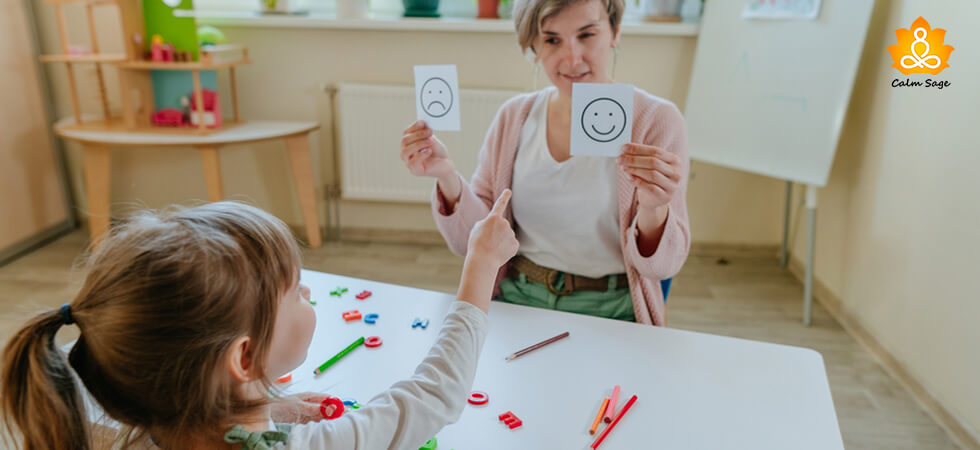What Is Emotional Coaching? Five Steps of Emotion Coaching

Our emotions and feelings play a huge role in developing a response toward various events in life. Do you know what plays an even bigger role? The way we choose to handle and cope with our emotions.
When we fail to regulate our emotions, the response is often out of proportion. Therefore, when you know how to handle, regulate, and cope with overwhelming emotions, you are able to generate a proportionate response in stressful situations.
Adults often learn to regulate their emotions and react accordingly. However, there are some adults who find it difficult to manage their emotions but it is very common among children. Children get overwhelmed very easily, sometimes they don’t understand their emotions, and other times they fail to express their emotions properly.
This results in a response that’s completely overboard and the child feels confused and out of control. That’s when emotional coaching comes in and today, we are going to see how the child can benefit from emotional coaching.
What Is Emotional Coaching?
“When Little people are overwhelmed by big emotions, it’s our job to share our calm, not join their chaos!” – L R Knost
The concept of emotional coaching was proposed by John Gottman (psychologist). According to American psychologist’s research and studies, emotional coaching is a technique that uses the child’s heightened emotions and responses to teach them to produce better responses.
Emotional coaching requires parents to be empathetic toward their children especially when they are experiencing tough emotions. Emotional coaching also involves verbalizing and validating the child’s emotions. This will make the child feel understood and heard, eventually calming them down.
Also Read: How to Help a Child Who Is Dealing With Rejection
Emotional coaching focuses on making the child understand their emotions better so that better responses can be produced. In fact, in emotional coaching bad or inappropriate reactions are not condemned. Parents wait for the child to calm down and then discuss the inappropriate reaction and the entire situation.
Let’s understand emotional coaching better…
Elements Of Emotional Coaching (Steps Of Emotional Coaching)
Emotional coaching basically focuses on tuning into your child’s emotions and making them understand their emotions and helping them cope. Emotional coaching for a parent is all about coaching your child about various emotions that they feel and how they can regulate those emotions.
Let’s have a look at the elements of emotional coaching to get a clear picture of what emotional coaching really is about…
- Focusing on complete emotional awareness for yourself and your child
- Using negative emotions as an opportunity for building a better connection with the child and teaching them emotional regulation
- Accept and validate the child’s emotions and feelings
- Help children verbalize their emotions once they have calmed down
- Help children with practical strategies to regulate their emotions in stressful situations
These 5 elements or steps of emotional coaching are all that a parent has to do with the child. You need to understand your child so that you can explain their emotions and feelings to them. Children are too naive to understand difficult emotions like fear, anger, disappointment, etc. Through emotional coaching, you can not only help them acknowledge their emotions but also regulate their emotions.
Also Read: The 4 Styles Of Parenting And Their Impact On Children
Tips For Being A Better Emotion Coach
Dealing with emotions can be a difficult task. You cannot lose your calm when you’re trying to teach your child to be calm. You can’t dictate your child or just demand them to react differently because you’re asking them to do so. You have to be gentle with them and tackle this situation with a lot of patience and empathy.
Here are a few tips you can use to become an even better emotional coach for your child;
- Make sure you look after yourself and your needs before you help your child. When your needs are looked after, you can deal with your child’s emotions with calmness.
- Seize everyday opportunities to talk about feelings and the situations that trigger them. Children get better at emotional regulation when they frequently talk about their emotions.
- Do not ever dismiss your child’s emotions, don’t make them feel like what they are feeling is wrong. Instead, help them validate their feelings and emotions.
- Help your child create a constructive mindset. Let them be open about their feelings and look for constructive ways to invest their emotional energy.
- Learn more about emotional coaching and explore new techniques that you use to help your child learn better ways to use their emotions.
Also Read 10 Signs You’re Healing From Childhood Trauma: You Will be Okay
That’s All Folks!
I hope you found this blog about emotional coaching helpful, interesting and informative. Emotional coaching can help your child understand their emotions better and also learn effective ways to respond to tough emotions. Moreover, it can also help in strengthening your parent-child relationship.
Thanks for reading.
Take care and stay safe.




















